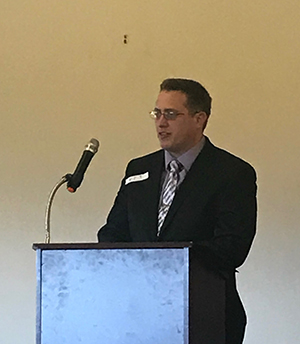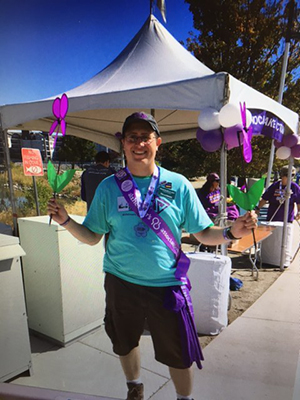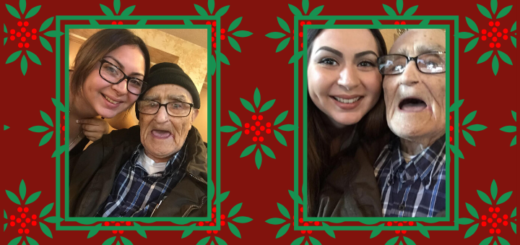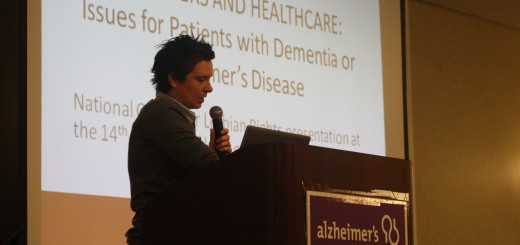Volunteer educator answers four common questions about Alzheimer’s
William Palmer of Reno has a passion for volunteering. The Alzheimer’s Association is just one of 10 organizations to which he dedicates his spare time. William volunteers for Walk to End Alzheimer’s, The Longest Day and as a community educator. William enjoys being able to educate others and answer their questions about Alzheimer’s.

Frequently asked questions
Before William starts a presentation, he knows that there are four common questions people ask. “I like to answer the questions in the beginning,” says William. “This way people don’t spend the whole presentation wondering about their question and not paying attention to other important information.”
#1: What is the difference between Alzheimer’s and dementia?
Alzheimer’s is the most common cause of dementia, a general term for memory loss and other cognitive abilities serious enough to interfere with daily life. Alzheimer’s disease accounts for about 60 percent to 80 percent of dementia cases.
When William answers this question, he likes to use a car analogy. He says, “Dementia is like a car, with Alzheimer’s being like the make of that car, such as Ford or Chrysler.”
Learn more: What is dementia, What is Alzheimer’s
#2: Do people die from Alzheimer’s?
“People can die with Alzheimer’s or from Alzheimer’s,” says William. “More likely the cause of death will be from pneumonia, other infections, falls or not eating.”
Alzheimer’s is a progressive disease, where dementia symptoms gradually worsen over a number of years. In its early stages, memory loss is mild, but with late-stage Alzheimer’s, individuals lose the ability to carry on a conversation and respond to their environment.
#3: What about essential oils, vitamins or other alternative treatments?
A growing number of herbal remedies, dietary supplements and “medical foods” are promoted as memory enhancers or treatments to delay or prevent Alzheimer’s disease and other dementias.
Claims about the safety and effectiveness of these products, however, are based largely on testimonials, tradition and a rather small body of scientific research. The rigorous scientific research required by the U.S. Food and Drug Administration (FDA) for the approval of a prescription drug is not required by law for the marketing of dietary supplements or “medical foods.”
Dietary supplements can have serious interactions with prescribed medications. No one should take a supplement without first consulting a physician.
There are drug and non-drug options that may help treat some symptoms of Alzheimer’s and other dementias. These treatments can help individuals living with the disease and their caregivers to cope with symptoms and improve quality of life.
Williams encourages people to reach out to their health care provider and the Alzheimer’s Association to learn about treatment options. He also lets them know about Alzheimer’s Association TrialMatch, a free service to learn about participating in research studies.
Learn more: Alternative treatments, Treatments
#4: Is Alzheimer’s genetic?
While tests are available to determine whether certain Alzheimer’s risk genes are present, for most people, William says “a simple DNA test will not tell you if you’re going to get Alzheimer’s.” The test will only tell if the genes that increase one’s risk are present. In less than one percent of Alzheimer’s cases, the disease is caused by a deterministic gene.
A family history of Alzheimer’s is not necessary for an individual to develop the disease. However, research shows that those who have a parent or sibling with Alzheimer’s are more likely to develop the disease than those who do not have a first-degree relative with Alzheimer’s.
Those who have more than one first-degree relative with Alzheimer’s are at an even higher risk. When diseases tend to run in families, either heredity (genetics), environmental factors “” or both “” may play a role.
Growing evidence indicates that people can reduce their risk of cognitive decline by adopting key lifestyle habits, such as physical activity, healthy diet and managing cardiovascular risk.
Learn more: Genetics, Causes and risk factors, brain health
Education opportunities
The Alzheimer’s Association offers both online and in person education programs. William says, “I encourage anyone who hasn’t heard the presentations to attend a workshop or watch it online. You can also contact the local chapter to request a community educator to speak to your organization or group.”
A family connection
William has three grandparents who have developed Alzheimer’s. “One grandfather passed away in 2002,” shares William. “My 92-year-old grandfather and my 91-year-old grandmother are still living with the disease. Now we think my uncle is showing signs.”
Read more about William’s connection to the disease in this 2016 blog post.

Volunteer to help end Alzheimer’s
William’s passion to volunteer motivates others to do the same. “I’ve been volunteering for things all my life. Volunteering is who I am,” says William. “If you’re going to volunteer your time, you should try to make a better world. Alzheimer’s disease and cancer are the big killers. Volunteering is a way to do your part to end Alzheimer’s.”
The Alzheimer’s Association is always looking for volunteers in a variety of areas. Learn more at alz.org/norcal/volunteer
Interested in learning more about our education programs? Visit our online resources or sign up for a local class today.

















